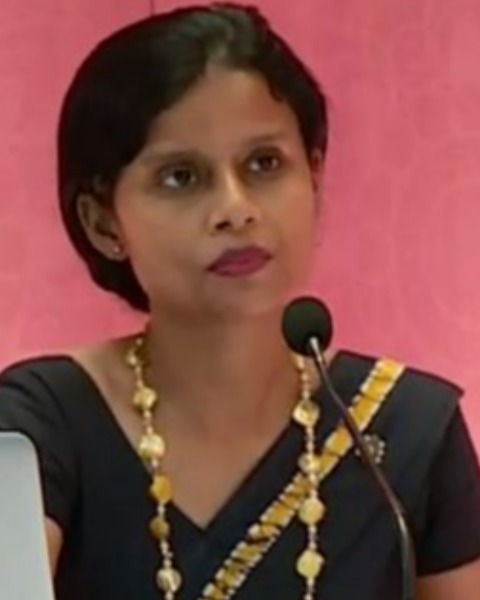Research (R)
Community-Based Participatory Research in hearing health care: a Sri Lankan case study.
PP1325 - Community-Based Participatory Research in Hearing Health Care: A Sri Lankan Case Study
POSTERS
Location: Halls A1-A2
Instructional Level: Intermediate

Dinukshi Ileperuma
Senior Lecturer in Audiology
University of Kelaniya
University of Kelaniya
Ragama, Sri LankaDisclosure(s): No financial or nonfinancial relationships to disclose.
Lead Presenter(s)
Abstract:
This qualitative study explores the intricacies of conducting participatory research in hearing health, in Sri Lanka. The research involved data collection through individual semi-structured interviews and the researcher's reflective journal, with analysis employing the Voice-Centered Relational method. While initially following an established community participatory framework, contextual factors compelled the authors to adopt a novel approach. This divergence from a Western-centric perspective is reframed as a success, as it uncovered the concept of 'comfortable participation' within a community eager to collaborate with gatekeepers and policymakers. This study highlights the potential for participatory research in developing nations, emphasizing adaptability and collaboration.
Summary:
This study delves into Community-Based Participatory Research in the context of hearing health in Sri Lanka, highlighting the challenges it poses in achieving research equity between academic researchers and community members. Cultural understanding and socioeconomic awareness are essential for successful engagement with the community. Complexity theory is applied to comprehend the multifaceted nature of hearing health, which encompasses health, economic, political, cultural, and religious dimensions. However, applying a western-centric approach to participatory research in a majority-world context is impractical. Power imbalances, colonial legacies, and the dominance of western medical models hinder progress in community participatory studies.
This study utilized a community participatory approach, employing semi-structured interviews and the Voice-Centered Relational method for analysis. Community entry activities, including engagement with gatekeepers and participation in religious rituals, were undertaken to build meaningful relationships. Engaging the community presented challenges, as residents initially hesitated to participate actively due to perceived lack of qualifications. They assumed a passive role, reflecting deep-rooted colonialism. Pre-existing relationships and the researcher's insider-outsider status within the community facilitated engagement, while power dynamics between academic researchers and communities remained a hurdle.
Participatory research emphasizes collaboration to achieve health equity. However, the inherent power and privilege of academic researchers often perpetuate systemic health inequities in underserved communities. The identities of the researcher and the participant significantly impact the research process and outcomes, highlighting the need for collective knowledge to address inequities.
In this Sri Lankan context, the western conceptualized framework of participation did not directly apply, as the community willingly accepted their perceived 'powerless' position, likely stemming from centuries of colonialism. Moreover, during data collection, the community faced pressing economic concerns due to a severe financial crisis. The study underscores the importance of exercising caution when applying western-centric knowledge and methods to participatory research in majority-world contexts. Acknowledging the influences of power, colonialism, socioeconomic status, and cultural factors is essential for a more effective and culturally sensitive approach to Community-Based Participatory Research.
This qualitative study explores the intricacies of conducting participatory research in hearing health, in Sri Lanka. The research involved data collection through individual semi-structured interviews and the researcher's reflective journal, with analysis employing the Voice-Centered Relational method. While initially following an established community participatory framework, contextual factors compelled the authors to adopt a novel approach. This divergence from a Western-centric perspective is reframed as a success, as it uncovered the concept of 'comfortable participation' within a community eager to collaborate with gatekeepers and policymakers. This study highlights the potential for participatory research in developing nations, emphasizing adaptability and collaboration.
Summary:
This study delves into Community-Based Participatory Research in the context of hearing health in Sri Lanka, highlighting the challenges it poses in achieving research equity between academic researchers and community members. Cultural understanding and socioeconomic awareness are essential for successful engagement with the community. Complexity theory is applied to comprehend the multifaceted nature of hearing health, which encompasses health, economic, political, cultural, and religious dimensions. However, applying a western-centric approach to participatory research in a majority-world context is impractical. Power imbalances, colonial legacies, and the dominance of western medical models hinder progress in community participatory studies.
This study utilized a community participatory approach, employing semi-structured interviews and the Voice-Centered Relational method for analysis. Community entry activities, including engagement with gatekeepers and participation in religious rituals, were undertaken to build meaningful relationships. Engaging the community presented challenges, as residents initially hesitated to participate actively due to perceived lack of qualifications. They assumed a passive role, reflecting deep-rooted colonialism. Pre-existing relationships and the researcher's insider-outsider status within the community facilitated engagement, while power dynamics between academic researchers and communities remained a hurdle.
Participatory research emphasizes collaboration to achieve health equity. However, the inherent power and privilege of academic researchers often perpetuate systemic health inequities in underserved communities. The identities of the researcher and the participant significantly impact the research process and outcomes, highlighting the need for collective knowledge to address inequities.
In this Sri Lankan context, the western conceptualized framework of participation did not directly apply, as the community willingly accepted their perceived 'powerless' position, likely stemming from centuries of colonialism. Moreover, during data collection, the community faced pressing economic concerns due to a severe financial crisis. The study underscores the importance of exercising caution when applying western-centric knowledge and methods to participatory research in majority-world contexts. Acknowledging the influences of power, colonialism, socioeconomic status, and cultural factors is essential for a more effective and culturally sensitive approach to Community-Based Participatory Research.
Learning Objectives:
- Describe the nature of the researcher-participant relationship in participatory research.
- Compile methods to reduce colonial mindset of researchers and participants in participatory research.
- Discuss sound as a complex entity in communities.
